“The optimal use of scarce resources, channelling of such resources to the points of best impact and putting in place accountability and result frameworks are needed now more than ever” – Dr. Muhammad Lawan Gana, Hon. Commissioner for Health, Yobe State.
A World Health Organisation report estimates that 20% to 40% of total health spending is wasted through inefficiency, adding that the attainment of universal health coverage could be accelerated through resource optimisation.
Now more than ever, showcasing resource optimisation-enabling interventions has become expedient as the fiscal space for government spending on health has narrowed significantly.
The maiden edition of the Health System Emerging Solutions Forum, themed, “Optimising Resources for Accelerated Progress Towards UHC,” gathered healthcare stakeholders to discuss and showcase promising interventions geared towards optimising health resources for a wider replication and to achieve impact at scale.
Since its inception in 2018, DGI Consult has designed and successfully implemented a number of donor-funded initiatives in the areas of health system evidence generation and analytics, organisational capacity strengthening, domestic resource mobilisation, facility and financial management, policy and system design and community health system strengthening, especially for increasing health service uptake.
Given the notable achievements and impactful initiatives undertaken by various stakeholders, there is a pressing need for a platform to spotlight successful innovations and interventions. As a response to this necessity, the Health System Emerging Solutions Forum was organized by DGI Consult on 14th November 2023.
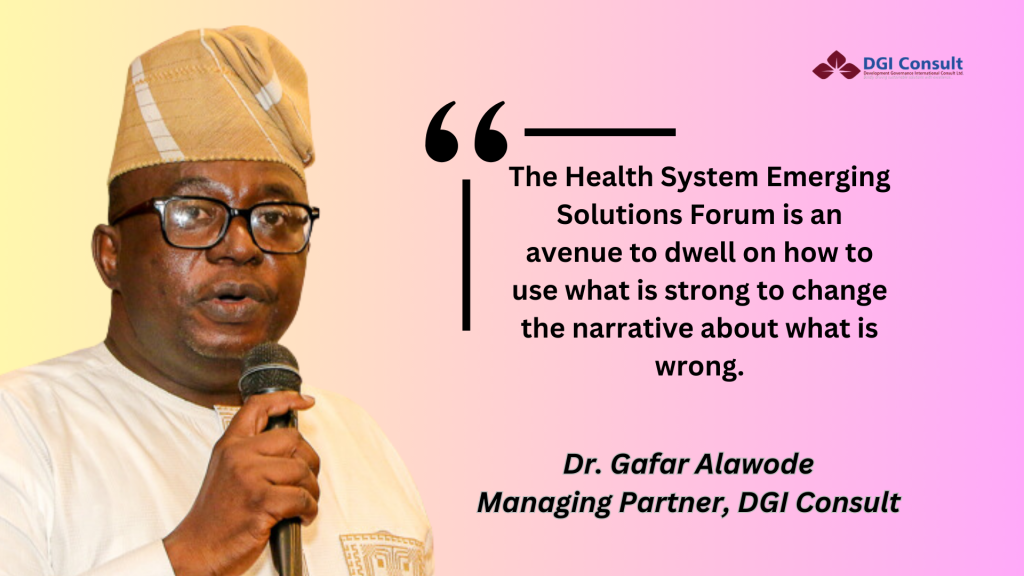
Dr Gafar Alawode said, “Across the country, examples abound about productive efforts geared towards health system repositioning. From Yobe State, where the health indices have improved significantly, to Gombe State where digital technology has reduced the number of ghost workers, to Nasarawa State, where Equity Fund and fruitful community engagement have expanded access of the poor to quality health care, to Delta State where the responsiveness of the political leadership has given health insurance coverage to almost 1.5 million residents, I believe we have a lot to showcase and learn from.”
The forum, through panel discussions and technical presentations, featured potent interventions that have effectively optimised health resources across manpower, money, and materials.
Using Data and Technology to Optimise Health Resources
The first technical session, which included four presentations and a panel discussion, focused on how healthcare stakeholders can use data and technology to optimise health resources.
McKinsey & Company recommended that African health systems expand their use of digital health tools as that could help their health systems to realise up to 15% efficiency gains by 2030, and further lead to the reinvestment of the savings to improve access and outcomes. It further stated that digital health tools could help health systems deliver care at better quality, faster, and at lower cost and thereby optimise constrained resources.
Recounting the DGI Consult Story on Resource Optimisation, Sekinat Sanusi, Senior Programme Officer at DGI Consult, said that the organisation promotes the use of evidence to improve governance in terms of policymaking, institutional arrangement, coordination, collaboration and accountability towards ensuring access to social services with equity.
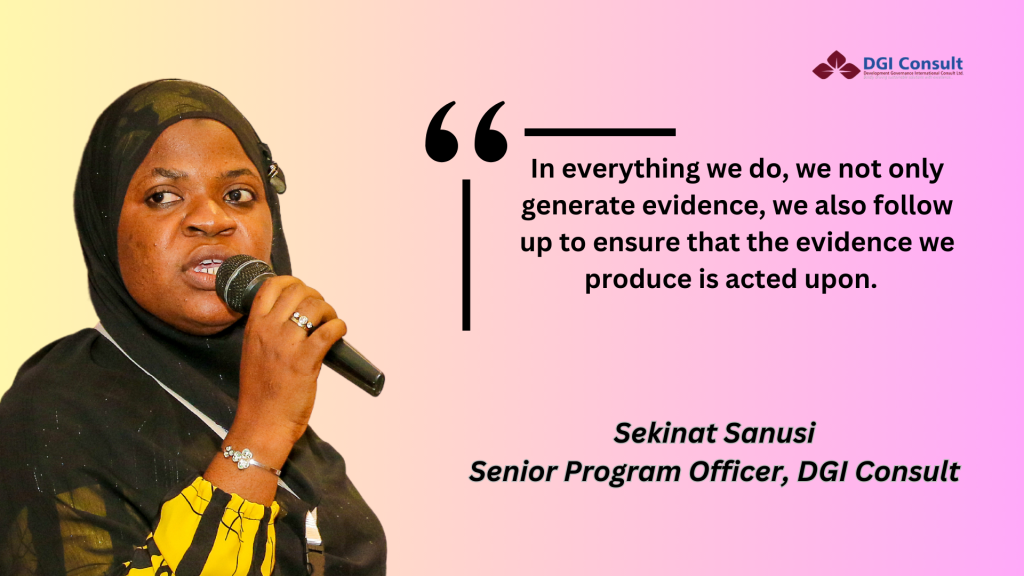
The Yobe State Contributory Health Management Agency (YSCHMA) is among the organisations that have received technical assistance from DGI to enhance their health insurance operations. Suleiman Dauda, Director of Programs at YSCHMA, then shared the agency’s experience in Using Data to Improve Health Insurance Operations. He said that data aided the agency to optimise quality operations and achieve customer satisfaction. According to him, data would enable insurance agencies to understand and analyse various performance indicators and scheme designs, as well as have sustainable financing.
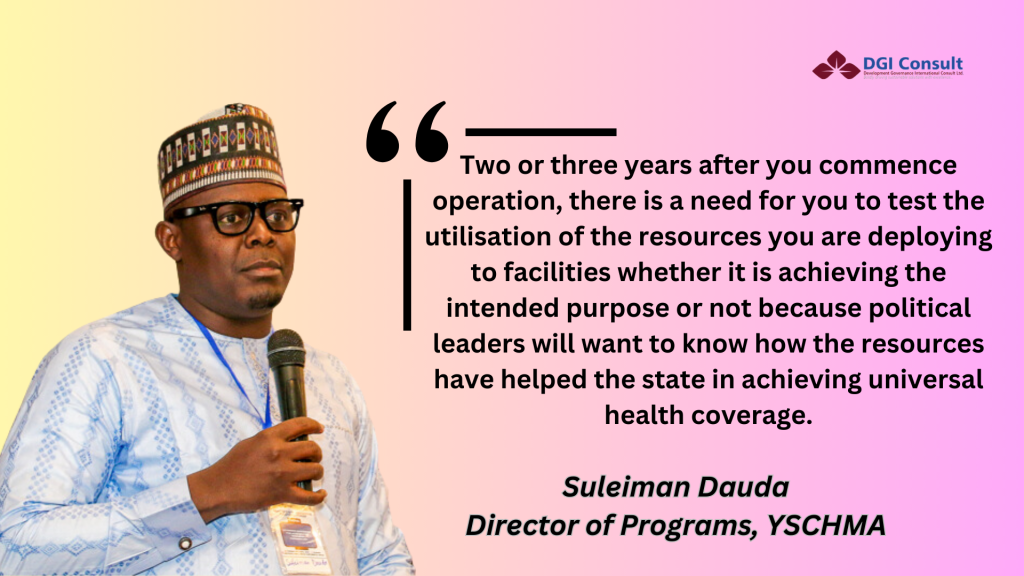
The Country Director of PharmAccess Nigeria, Dr. Njide Ndili called for stronger political will in health financing during her presentation on Optimising Health Resources through Technology. She then noted that the use of data and technology would help to improve quality, access, health outcomes and patient empowerment.
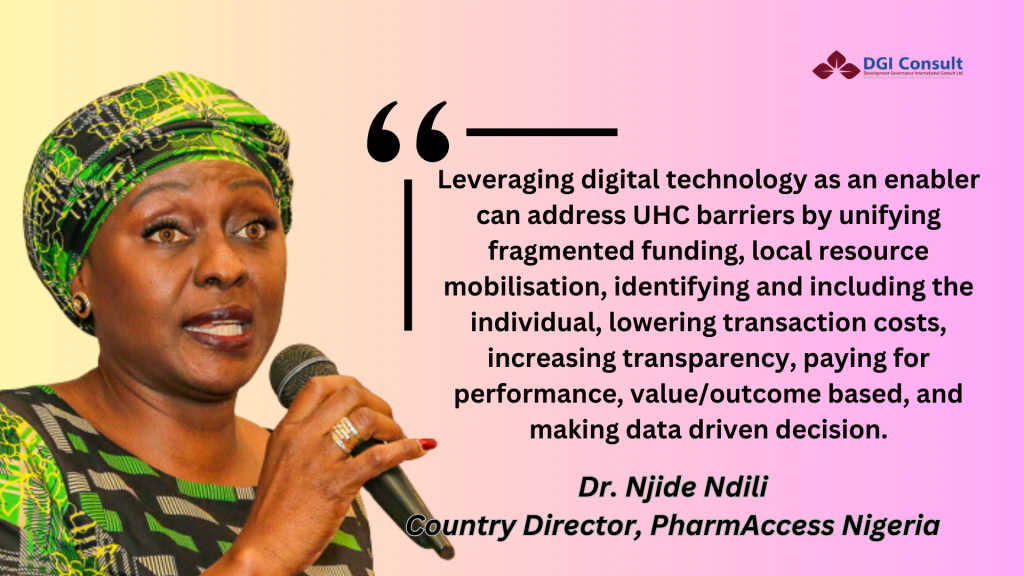
Corruption in the healthcare system is a menace, hence, Prof. Dina Balabanova, Professor of Health Systems and Policy, London School of Hygiene & Tropical Medicine, in her presentation on Curbing Corruption in the Health Sector revealed how to tackle it.
Noting that corruption reflects systemic and power factors, she recommended that defining the particular practices to be addressed, targeting the root causes of problems, focusing on preventative approaches and understanding risks, are some of the solutions to the problem.
Data and Technology for Best Resource Optimisation
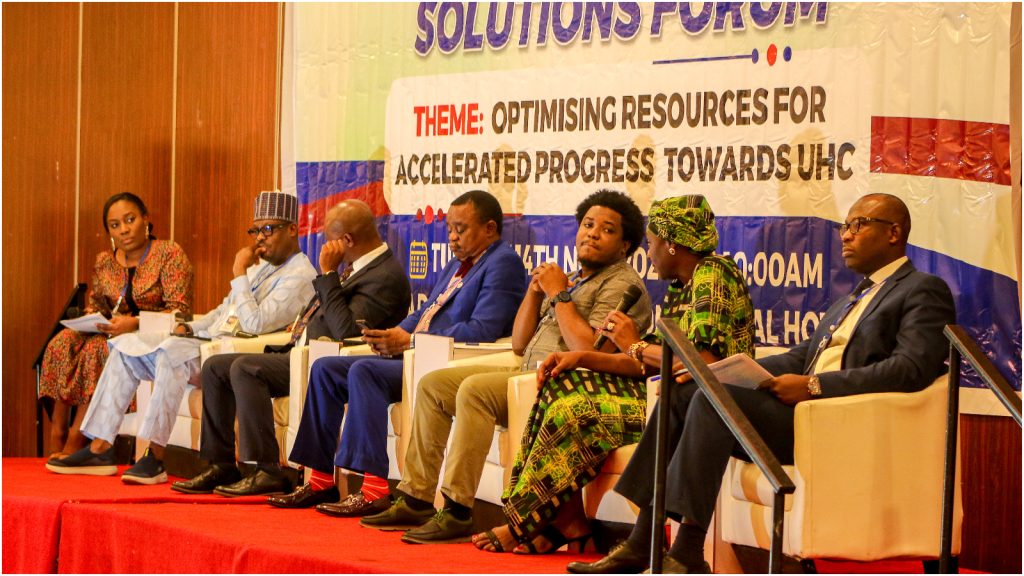
The first panel session further delved into the optimisation of health resources through targeted questions, focusing on the use of data and technology.
Addressing the Practical Approach to Optimising Private Healthcare Providers’ Contribution to Health System Development, Dr. Jimmy Arigbabuwo called for a critical consideration of the procurement and audit system, along with a focus on statistics, monitoring and evaluation to ensure optimisation.
Dr. Prince Agwu, Research Associate, University of Nigeria Nsukka, in discussing Specific Recommendations for Key Stakeholders Regarding Actions for Curbing Corruption in the Health Sector, highlighted the prevalent absence of rules, insecurity, and undue political interference. He recommended that health facilities should be made to embody the values of well-defined systems, incorporating clear rules, regulations, values, and service provision.
Speaking on lessons learned in Optimising Health Service Utilisation by the Poor and Vulnerable, Oluchukwu Obele – Program Coordinator at Christian Aid Nigeria, stated that paying premiums for the poor and vulnerable does not necessarily translate to service utilisation. According to him, raising awareness about service utilisation is crucial.
Getting The Best Out of Health Workforce: What Should Be Done Differently?
The second technical session centred on strategies for optimising the health workforce. The session commenced with three presentations and included a panel discussion to explore ways to enhance the effectiveness of the health workforce.
On how to Optimise Health Workforce in Low- and Middle-Income Countries, Dr. Diana Bowser, Course Director at Harvard School of Public Health, noted system thinking and the use of economic arguments as the key approaches. She illustrated these concepts with the Harvard “Control Knob” Approach,which targets financing, payment, organisation, regulation, and health worker behaviour to enhance efficiency, access, and quality of care. The performance goal of this approach is to improve health status, customer satisfaction, and risk protection for the target population.
Dr. Olumide Okunola, Senior Health Specialist at the World Bank, gave a presentation on the Nigeria Sector Wide Program for Health, stressing the Basic Healthcare Provision Program (BHPP) Sector-Wide Approach (SWAp). He said the government-owned initiative aims to enhance alignment, harmonisation, and accountability between donors and the government. The program features a clear vision, well-defined institutional arrangements, and measurable indicators directly linked to resource allocation.
Dr. Ismail Jibrin, founding partner of Human Capital Manager Nig. Ltd., cited the example of the Gombe Biometric Attendance Tracking Technology in his presentation on Transforming Human Resources for Health Management Through Digital Technology. He said that the biometric attendance tracking was designed to address absenteeism and optimise human resources for health in the state. According to him, the creation of the biometric process seamlessly linked health workers’ attendance to payroll, hence, achieving the goal of reducing workers’ absenteeism among other results.
Strategies for Maximising the Potential of the Health Workforce
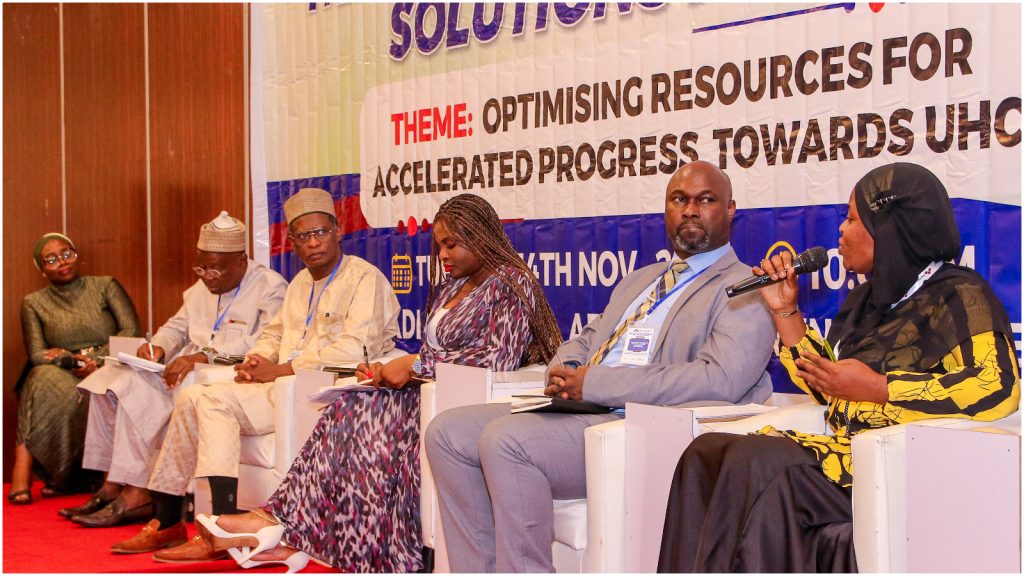
The second panel discussion shared organisational experiences, providing deeper insights into strategies that can be employed to get the best out of the health workforce.
Dr. Bolanle Olusola-Faleye, the Chief-of-Party of the USAID-LHSS Project, shared how the organisation is enhancing institutional capacity in supported states through individual, organisational, and systemic capacity building. She highlighted the importance of a tripod approach that combines competency and leadership training with tools development and mentoring.
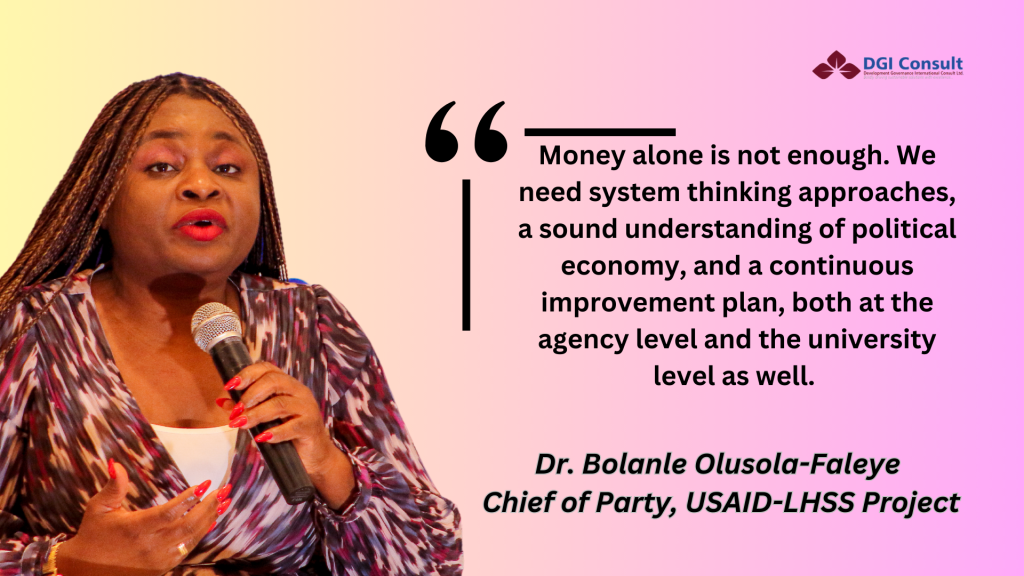
Dr. Ufuoma Festus Omo-Obi, the Regional Director, West and Central Africa, Options Consultancy Services Ltd., outlined the Intervention Options for Reducing Inefficiencies in the Health Sector’s Human Resources. He stressed the need for adequate funding to ensure proper remuneration for health workers, adding that incentives extend beyond monetary rewards. According to him, creating the right working environment and motivation for service providers are important.
Fatai Ogunlayi, Consultant in Public Health and Member of the UK FPH, Africa SIG, discussed the Strategies for Effectively Implementing Best Practices from Developed Countries in the Context of Low-And-Middle-Income Countries. He stressed the importance of adapting best practices to the local context by understanding what worked, for whom, and why, through contextualisation and socialisation of interventions.
What Next?
To sustain the conversation on optimising health resources to achieve universal health coverage in Nigeria, DGI Consult is introducing the Emerging Solutions Repository. The Emerging Solutions Repository is a digital platform that will be hosted on our website to gather and disseminate promising health system initiatives and innovations undertaken by a diverse array of stakeholders within the healthcare sector. This valuable resource will be a focal point for all stakeholders interested in advancing universal health coverage.